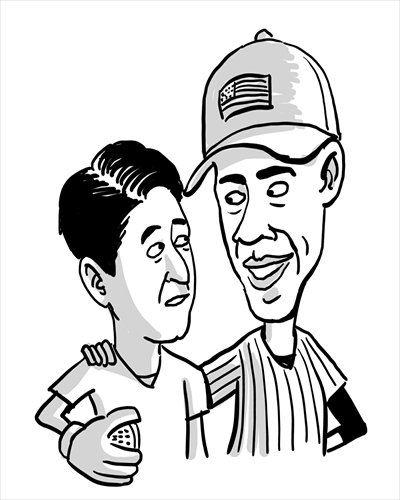Baseball diplomacy in Japan shows US knows how to hit home runs

The Japanese government presented two former baseball players with the People's Honor Award recently, causing a sensation in the country.
The two winners were Shigeo Nagashima in his late 70s and Hideki Matsui who has just retired. Once a player and coach of a famous Japanese professional baseball team Yomiuri Giants, Nagashima is one of the most celebrated baseball players in postwar Japan. As a favorite apprentice of Nagashima, Matsui went across the Pacific Ocean to play in the US Major League Baseball for many years.
Major media scrambled to report this piece of news and some newspapers even published extra features. However, interviews on TV showed that the general public was more confused than happy.
Nagashima has been famous for decades, why is he being rewarded now? While Matsui is an excellent player, he is not a legend like Nagashima, is it mature to honor him now?
The decision is indeed somewhat doubtful. The award came from the Japanese government instead of the professional sports circle. Therefore, the decision may have taken more into consideration than pure sporting achievements.
As the most popular game in Japan now, baseball can be matched with the "national sport" of Japan, sumo. Besides professional teams, most high schools and universities also have baseball teams. The annual National High School Baseball Championship has almost the same popularity as professional tournaments when aired on television. Children are often seen playing baseball in parks on weekends. Such a phenomenon occurs not only because of the appeal of baseball, but also thanks to historical and political factors.
As the "national sport" of the US, baseball was taken to Japan by Americans after the Meiji Restoration and gradually grew in popularity. Matsutaro Shoriki, who was once a bureaucrat and later took over management of Yomiuri Shimbun, even helped found the National Baseball Team.
Nevertheless, baseball was still criticized as an exotic influence. Asahi Shimbun gave enormous publicity to the harm of baseball because its style did not fit the temperament of traditional Japan and enthusiasm for such a game was supposed to yield a negative influence on physical fitness. The Japanese government moved to suppress the popularity of baseball and once even forbade it from being played in schools and universities.
In particular, after the outbreak of the war with the US, the army became hostile toward the sport. It was said that military officers compelled schools to stop the activities of baseball teams and even beat players.
But the situation changed acutely after Japan was defeated and occupied by the US. The General Headquarters commanded by General Douglas MacArthur decided to revive baseball immediately after controlling Japan. With the purpose of giving hope to the Japanese people, the US implanted baseball culture into their society and made it a symbol of "democratization."
Various restrictions in the prewar period were canceled and most competitions resumed.
In 1947, Shoriki who had been imprisoned as a war criminal was released. While serving as the commissioner of the Japanese Baseball League, he imitated the Major League Baseball system and set up two leagues for Japan's professional baseball - the Central League and the Pacific League that are still thriving until today.
Throughout history, baseball was not only a game but also a symbol of Japan-US relations and its status changes with the rise and swell of diplomacy between the two countries.
At the end of last year, Shinzo Abe expressed many times that he would pay a visit to the US upon being elected prime minister. He finally made it in February this year and issued a speech entitled "Japan is Back."
Against such a background, it seems natural to honor Nagashima and Matsui. As now it seems clear, there are complicated factors beyond professional sports behind such seemingly simple awards.
The author is a scholar living in Japan. opinion@globaltimes.com.cn